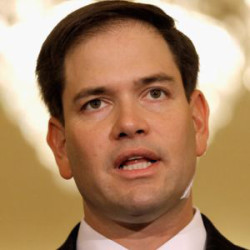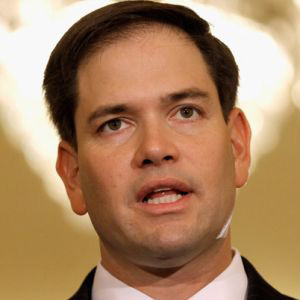EXETER, N.H./MILFORD, N.H., (Reuters) – U.S. Senator Marco Rubio, emerging from the first presidential nominating contest in Iowa as the leading Republican mainstream contender, portrayed himself in New Hampshire yesterday as the party’s best hope to recapture the White House.

But Rubio, 44, a U.S. senator from Florida, faces a strong field of establishment rivals in next week’s New Hampshire primary after his stronger-than-expected third-place finish in Iowa behind front-runners Ted Cruz, 45, and Donald Trump, 69.
“If I am the nominee, we are going to beat Hillary Clinton and it won’t be by the flip of a coin,” Rubio told supporters in Exeter, New Hampshire, taking a jab at the close Democratic race in Iowa between Clinton and challenger Bernie Sanders, where some precincts were decided on a coin flip.
Other more mainstream Republicans including former Florida Governor Jeb Bush, Ohio Governor John Kasich and New Jersey Governor Chris Christie, are expected to do better in New Hampshire than in Iowa and vie with Rubio to become the establishment favourite.
Cruz and Trump also headed to New Hampshire as the presidential race shifted to the second nominating contest in the state-by-state battle to pick nominees for the Nov. 8 election to replace Democratic President Barack Obama.
Trump told a news conference before a rally in Milford, New Hampshire, that he felt “a tinge” of disappointment at losing to Cruz in Iowa. The billionaire businessman also picked up an endorsement from former Massachusetts Senator Scott Brown.
Cruz told New Hampshire supporters he was like former Republican President Ronald Reagan, urging the state to help ensure his nomination by giving him a win in the Feb. 9 primary.
“Every day from now until Election Day here in New Hampshire, I’m going to continue asking for the men and women of New Hampshire to make that same fateful decision yet again so that we can reignite the promise of America,” Cruz said.
Cruz, a conservative U.S. senator from Texas, beat Trump in Iowa’s Republican caucuses with the help of the state’s large bloc of evangelical Christians, but he might struggle to finish on top in New Hampshire, where Republican voters have a more secular and libertarian streak.
Cruz apologized to rival Ben Carson over an email his campaign sent on Monday night implying Carson was dropping out of the race and his Iowa backers should switch to Cruz.
“This was a mistake from our end, and for that I apologize to Dr. Carson,” Cruz wrote.
The campaign for Carson, who finished fourth in Iowa, said the retired neurosurgeon had accepted Cruz’s apology but that the incident was the sort of “dirty trick” politics that Carson was trying to fight.
U.S. Senator Lindsey Graham of South Carolina, who dropped out of the race in December, said a recent hardening of Rubio’s position on immigration and the strength of his anti-abortion stance might cost him.
“Running to the right to win Iowa is going to be a hard sell here in New Hampshire,” Graham, a supporter of Bush, told Reuters in Rindge, New Hampshire.
The son of Cuban immigrants, Rubio said he was the candidate to unite the Republicans in the November election, when the party hopes to regain the White House after Obama’s two four-year terms.
“People realized on the Republican side that we cannot afford – this country cannot afford – to lose this election, and that I give the party the best chance not just to unify our party but to grow it,” Rubio told ABC’s “Good Morning America” from Manchester, New Hampshire.

